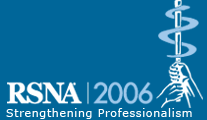
Abstract Archives of the RSNA, 2006
Minesh P. Mehta MD, Presenter: Consultant, Pharmacyclics, Inc
Background: In a previous randomized study, RT plus MGd prolonged time to neurologic progression (TNP) in NSCLC patients (pts) with brain metastases (p=0.048).
This Phase 3 trial (PCYC-0211 or SMART trial) randomized pts with brain metastases from NSCLC and KPS =70 to whole brain radiation therapy (RT, 30 Gy/10 fractions) or RT+MGd, 5 mg/kg qd x 10. A sample size of 550 was based on a=0.001, ß=0.8, hazard ratio (HR)=0.65, with a primary endpoint of TNP determined by a blinded Events Review Committee.
554 pts received RT (N=275) or RT+MGd (N=279), 348 in North America (NA), 206 in Europe and Australia (EA). Treatment arms were balanced for factors of known prognostic importance. Most pts were in RPA Class 2 (90%), had multiple brain metastases (81%), extracranial metastases (51%) and presented with neurologic deficits (84%). Treatment with MGd was well tolerated, with 92% of intended doses administered. Most common MGd-related grade 3+ adverse events were hypertension (4%), ALT increase (3%), and fatigue (3%). TNP improved from 10 months (mo) for RT to 15.4 mo for RT+MGd, p=0.12, HR=0.78. Time to neurocognitive progression was also improved, p=0.089, HR=0.79. More RT pts required salvage brain surgery or radiosurgery than RT+MGd pts (41 RT, 19 RT+MGd). In NA pts, statistically significant prolongation of both TNP, from 8.8 mo for RT to 24.2 mo for RT+MGd, p=0.004, HR=0.53, and time to neurocognitive progression, p=0.04, HR=0.69, were observed. In NA, RT was started sooner after the diagnosis of brain metastases than in EA (median 1.6 weeks NA vs. 3.1 weeks EA, with 79% of pts treated within 3 wk in NA compared with 50% of pts in EA). When RT was initiated within 3 weeks of brain metastasis diagnosis, regardless of region, TNP was significantly prolonged by addition of MGd (N=378, p=0.006, HR=0.59). When initiation of RT was delayed beyond 3 weeks after brain metastasis diagnosis (N=176, 21% of NA pts, 50% of EA pts), MGd benefit was lost. A major reason for RT delay was use of chemotherapy as initial treatment for brain metastases. TNP was also prolonged with MGd in pts whose lung cancer was newly diagnosed with synchronous brain metastases (N= 259, p=0.032, HR=0.59), in pts who had never received chemotherapy prior to randomization (N=331, p=0.044, HR 0.66) and in RPA Class 2 pts (N=499, p=0.018, HR=0.67).
MGd significantly prolonged TNP in NSCLC patients with brain metastases receiving prompt RT in this randomized Phase 3 trial. The majority of patients in NA received prompt RT (79%), leading to a statistically and clinically significant benefit when combined with MGd. Patients who were chemotherapy-naive, or in RPA class 2 also benefited with the addition of MGd, in terms of delaying time to neurologic progression.
Mehta, M,
Invited Paper: Motexafin Gadolinium (MGd) Combined with Prompt Whole Brain Radiation Therapy Prolongs Time to Neurologic Progression in Non-Small Cell Lung Cancer (NSCLC) Patients with Brain Metastases: Results of a Randomized Phase-3 Trial. Radiological Society of North America 2006 Scientific Assembly and Annual Meeting, November 26 - December 1, 2006 ,Chicago IL.
http://archive.rsna.org/2006/8002449.html

